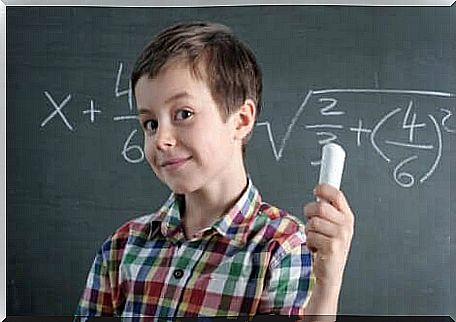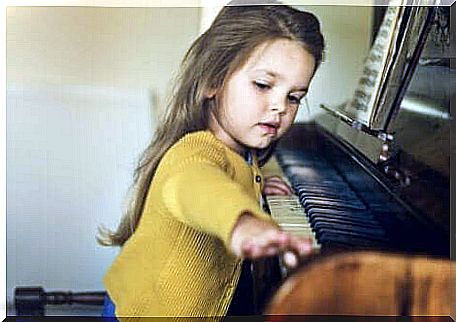The Differences Between Genius And Talent

In this article, we will try to find out if genius and talent are two sides of the same coin, or if there are differences between the two.
We will take Spain as an example. During the academic year 2017-2018, only 34,113 high-capacity students were identified among a total of 8,161,144 students. This corresponds to only 0.42% of the total number, as shown by data from the Ministry of Education and Vocational Training.
Although the numbers may look different in different countries, the fact is that it is not easy to spot talented or ingenious children in school. We’re talking about talented kids, but what about geniuses? Is a gifted child the same as a genius?
The answer is no, and that’s why we want to explain some differences between genius and talent. In general, we can say that gifted children are very intelligent children with an IQ of over 130 (the average intelligence is 100 in the global population statistics). On the other hand, geniuses are people who have excelled in a certain field thanks to a very specific talent.
But geniuses do not necessarily have to develop their intelligence as early as gifted children do. People classify them as geniuses because they have done a certain job that has been particularly important or influential to society. But what other differences are there between genius and talent?

The definitions of genius and talent
Before we go a little deeper into the differences between genius and talent, let’s clarify the definitions of concepts. Swedish dictionary defines genius as belonging to an ” extraordinarily gifted person, intellectually or artistically “. On the other hand, it defines the gifted as a person ” who has good understanding or great talent in general or in the indicated sub-area “.
However, these definitions do not really answer our questions. At first glance, they seem to be very similar concepts – where genius is an extreme variant of talented – but in reality they are not. In addition to the Swedish Academy’s definition, psychology believes that talent refers to people who succeed in achieving a high potential in certain specific areas.
To be considered gifted, a person’s IQ (intelligence ratio) must be higher than 130. The definition of “gifted” is related to social attributes and according to Leandro Quiroz, an expert psychotherapist in giftedness, it is about people who stand out in many ways.
These people are characterized by a diverse way of functioning on a neural, mental, cognitive and executive level. They also tend to have certain specific personality traits.
A genius, on the other hand, is someone who stands out extremely in a specific, specialized area. It is a person who performs an ingenious work; an important and significant work for society. In other words, they are people with special talents. They are creative, groundbreaking and innovative.
In summary, we can say that a talented person is a person who is talented in all areas, while a genius is extremely talented in a more specific area.
The differences between genius and talent
To move on, we will now look at the clearest differences between genius and talent. As we see, they are related to the type of intelligence, the areas it covers and the motivation to learn.
So what should you do if you work in a psychopedagogical or psychological context and encounter a child with incredible abilities or above-average intelligence? The first is to make a proper evaluation before drawing any specific conclusions. The next step is to establish an education plan to help the child in its development, quality of life and self-esteem.
Areas where people stand out
A talented person is one who is very intelligent in several different areas: mathematics, mother tongue, foreign languages, etc. In other words, their intelligence encompasses many different aspects.
On the other hand, the sentient definition of a genius is someone who stands out extremely within a certain area. In some cases, these also fall behind in other areas of knowledge.
Intelligence versus talent
A gifted child usually has an innate ability to cope with tasks and solve difficult problems. Their intelligence usually develops very early. It is often discovered when they are very young, however, this is not always the case.
A genius does not have to be very intelligent. What defines them as a genius is their talent and work in a certain sphere. For example, an artistic genius or a great mathematician.
Early development of intelligence
In line with the previous point, another of the differences between genius and talent is an early development, which we have already touched on. In gifted children, intelligence is high and early developed (meaning they are children who can solve more difficult problems than one might expect at their age). But with geniuses, this does not necessarily have to be the case.
A genius does not necessarily show this early intelligence and we thus discover them when they implement their talent. In other words, thanks to their work.
The motivation to learn or create
The motivation to develop a certain talent or to be prominent in a certain area is another of the differences between genius and talent.
Gifted children should generally be motivated in school for the benefit of society. This is why the discovery of outstanding abilities is so important, especially to avoid boredom in children. On the other hand , geniuses tend to have a more inherent and innate motivation to develop their own talent. That’s because they really like what they do.
It is quite easy to verify this, because those we consider to be geniuses are known for their achievements or work that they develop because they actually want to. In other words, they are passionate about something they are also very good at.

Discovered
Although it is usually not easy to spot talented children in school, at least not always at an early stage, the fact is that it is easier to spot them compared to spotting geniuses. This can be explained by the fact that gifted children tend to learn much faster. Strangely enough, they can also be children who perform poorly in school, simply because they quickly get bored. No matter how it is now, people notice that their intelligence is above average.
On the other hand, geniuses do not necessarily have to be more intelligent or easier to spot than others. They may be completely normal children in school, from an educational point of view, but once they leave school, they develop a special talent in a more specific area (for example music). This is then another difference between genius and talent.
If children already differ so much from each other, then imagine the situation between geniuses and talented children. There will always be differences! And there is often a world of differences between them. For this reason, we must never generalize. We should simply analyze each individual case.
It is very important to make sure that we accompany the child on their journey, as parents or teachers or the like. We need to adapt to their needs in order to strengthen their strengths.
The most important thing of all, however, is to ensure the child’s well-being and always encourage them to feel fulfilled in the areas they want to develop.








